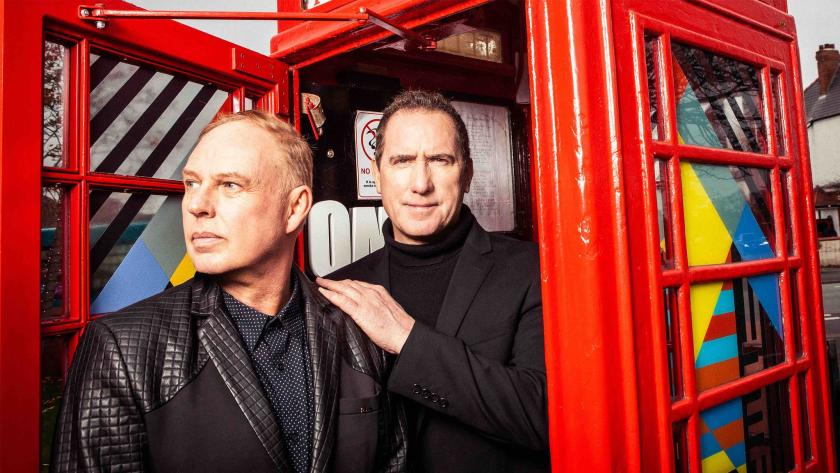A persistent moan of this writer in recent years, about gigs attended by those his own age (54) and up, is that, however good the band is, the audience are stationary, staring, semi-catatonic. They don’t twitch or move, facing stage-wards earnestly, silent, as if watching Chekov at the theatre. Their joy, if it exists, is internalised, unreleased. Dancing something forgotten long ago. Such gigs are flat, disappointing, like the airless, staid classical concerts I was taken to as a boy, contemplative and half-asleep. It is, then, a blissful surprise to find Eighties synth-pop outfit OMD’s crowd so joyously, joyously lively.
Grey hair may be predominant but when frontman Andy McCluskey suggests everyone jump up and down during a banging take on mid-Eighties hit “Tesla Girls” - not really a very good song - most do, and even on the seated balconies of the three-quarters full Brighton Centre arms are waved in the air. Indeed, every time a “Radio Gaga”-style clap-along is suggested, everyone’s in, right away, no quibbling. Looking about, it’s a sea of grins and movement and slopped drinks.
Maybe this spontaneous Tuesday night revelry is partly down to the way OMD no longer make any pretence at cool. McCluskey, always a dad-dancer, is like a wannabe-groovy uncle, flitting about the stage doing bizarre moves that are part Ian Curtis, part playground show-off. His exhortations are cheesy but enthused - “We are relentless and resistance is futile” – yet they're also goofily contagious, and the way that the four of OMD point and clap at each other when one of them shines – such as when quiet synth dude Martin Cooper plays a sax solo - is a delight.
The evening starts well with support act Scritti Politti. Black-clad (as OMD are later), their reggae-tinged, digitally anaemic, Eighties funk-pop does not appeal, even though they hammer through their most famous songs – “The Sweetest Girl”, “The Word Girl”, “Wood Beez (Pray Like Aretha Frankin)” and so on – but grey-bearded frontman Green Gartside is an endearing presence, forthright, chatty and likable, and the two more recent songs, “Trentavious White” and “The Boom Boom Bap”, paying tribute to his love of hip hop, stand intriguingly apart from the rest of the short set.
Despite their aforementioned gawky lack of pretension, OMD’s actual show is impressive, an array of blinding lights and a triptych of large screens behind them firing out imagery, ranging from Hollywood silent star Louise Brookes (for tribute song “Pandora’s Box”) to visual feedback of the kind used in the opening sequence of 1970s Doctor Who. It’s perhaps at its most effective at the start, displaying girders and industrial imagery as they open with the whole of 1981 album Architecture & Morality.
This album, of course, includes the stately, gorgeous “Maid of Orleans”, as well as the swirling loveliness of “Souvenir”, a song that appeared recently in Stephen Merchant’s comic BBC drama The Outlaws, where it represented longing nostalgia. It’s fair to say that longing nostalgia is rife in the air here too, songs danced to at suburban teenage house parties suddenly, briefly, loud and potent, awakening a very particular kind of deep-felt middle-aged elation.
OMD indulge in their own harking backwards for the song “The Beginning and the End” as they emulate their old heroes Kraftwerk, forming a line at the front of the stage at tiny keyboards, stationary shadows in smokey spotlights. This closed the Architecture & Morality section of the show. What’s amazing about the latter half of the evening is that, despite being dominated by later-Eighties material I genuinely don't like, it remains ebulliently enjoyable; songs such as “(Forever) Live and Die”, sung by OMD’s other central figure Paul Humphreys, “Sailing on the Seven Seas” (turned into a glam stomp), “So in Love” and the godawful stinker “Locomotion”.
Other entertainments along the way include a purple bra thrown at McCluskey, which ends up on drummer Stuart Kershaw’s head, but happily there’s more left in the tank than cheap frivolity. “Enola Gay” contains one of the greatest keyboard motifs in all electro-pop and causes jogging-on-the-spot havoc and, while the encore may contain the unpleasing “If You Leave” from the soundtrack to Molly Ringwald-starring Eighties teen flick Pretty in Pink, it also features what McCluskey describes as OMD’s “fastest song”, debut single “Electricity”, another synth-pop gem. They then close with obscure and atmospheric 1983 slowie “The Romance of the Telescope”. It’s a smidgeon of their old arty wilfulness tacked onto a night of unapologetic and enjoyable crowd-pleasing.















Add comment